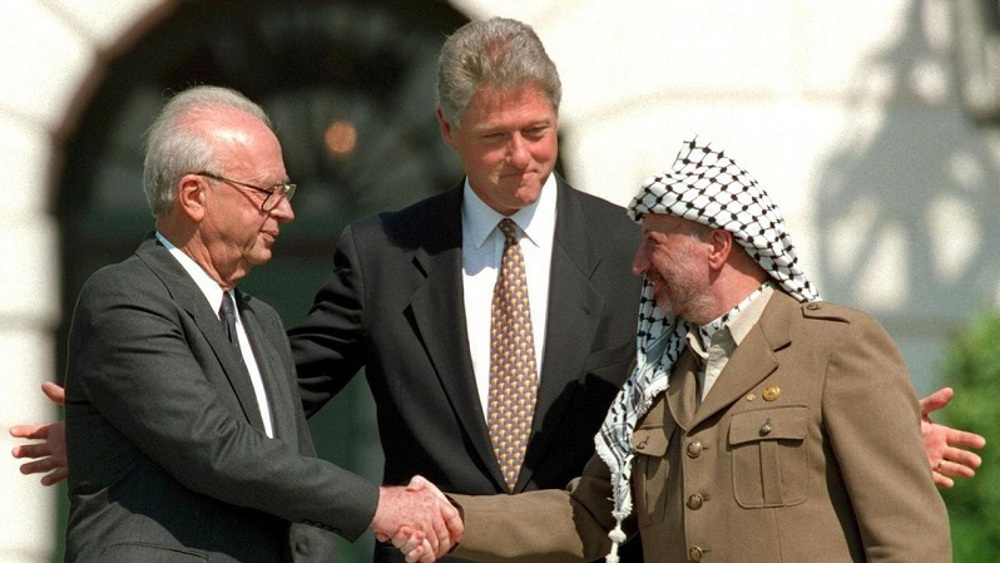Peace with Israel, a lesson in futility
On December 10, 1978, Egyptian President Anwar Sadat and Israeli Prime Minister Menachem Begin were awarded the Nobel Peace Prize at the US presidential retreat known as Camp David.
Three months earlier, US President Jimmy Carter, Anwar Sadat and Menachem Begin had signed a peace treaty between Egypt and the Israelis.
The Nobel Committee said at the time that it was awarding the prize to the two for that treaty.
But while Egypt continues to be one of the few Arab countries to have formal relations with the Israeli regime, to this day, peace itself, as defined by Arab populations, remains impossible with Tel Aviv.
Sadat sought to retake control of the Sinai Peninsula, which Egypt had lost to Israel during the Six Day War of 1967, by making peace with Israel.
He did retake control of the Sinai Peninsula, but by recognizing Israel as a state, as well as offering concessions in the treaty itself, he put himself at odds with the wider and much bigger Arab populations.
One such group was the Palestinians themselves, whose historical land Israel had been occupying since 1948. Sadat had made no attempt to address Israel's occupation of the Palestinian territories, nor Syria's Golan Heights or Jordan's West Bank, which had also been occupied by Israel.
Arab governments reacted by expelling Egypt from the Arab League. And anger on the Arab streets raged towards Israel and Sadat, not least on the streets of Egypt itself.
The country was convulsed in the months after the signing of the treaty by an uprising against the status quo and the Egyptian president was ultimately assassinated during a parade in Cairo on October 6, 1981.
Years later, the Palestine Liberation Organization, the PLO, which had opposed Sadat's so-called peace treaty with Israel, tried its own hand at compromise.
Just as Carter had mediated years earlier between Sadat and Begin, US President Bill Clinton watched as PLO leader and president of the Palestinian Authority, Yasser Arafat, and Israeli Prime Minister, Yitzhak Rabin, shook hands and signed what became known as the Oslo Accords.
The agreements secretly negotiated in Norway led to the recognition of Israel by the PLO and of the PLO by Israel as the representatives of the Palestinian people.
Needless to say, Arab peoples continued to view Israel as an occupier, and were adamant that the PLO was not representative of all Palestinians.
The accords never led to real peace, as the Israeli regime continued its acts of aggression against Palestinians and other Arab countries.
The Israelis attacked the Gaza Strip multiple times and even occupied the territory before Hamas, another Palestinian group, forced the Israeli military out.
Tel Aviv continued to build settlements on occupied territories in an attempt to make the establishment of any Palestinian state impossible which naturally made peace impossible.
Arafat himself, despite his numerous concessions to, and compromise with the Israelis, continued to be the subject of continued and committed Israeli assassination attempts as he was considered a symbol of the fight against Zionism.
He suddenly fell ill on October 25, 2004, and died days later.
While much controversy arose over his cause of death, subsequent studies found him to have died of polonium poisoning.
Arab leaders have in the past attempted to make peace with Israel, but the regime has proven to be recklessly determined to occupy and keep land that doesn't belong to it.
As such an entity, Tel Aviv will forever be an impossible partner to peace and Arab populations, regardless of what their governments may do, seem to know this.
VIDEO | Press TV's news headlines
Israel has slaughtered 13000 students in Gaza, West Bank
VIDEO | More Zionist than Zionists: Biden’s legacy to be defined by Gaza genocide
Hamas confirms handing approval of Gaza ceasefire deal to mediators
VIDEO | Iran: Show of strength
UNRWA will ‘stay, deliver’ aid to Palestinians despite Israel’s ban: Lazzarini
Explainer: What makes Iran's Rezvan and Raad loitering munitions prized assets?
VIDEO | Unseen agony: Missing loved ones of genocide in Gaza

























 This makes it easy to access the Press TV website
This makes it easy to access the Press TV website